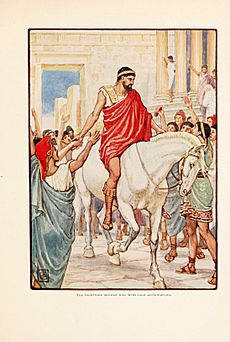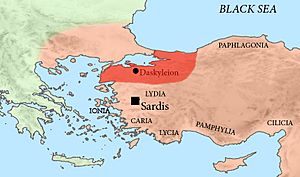Alcibiades facts for kids
Quick facts for kids
Alcibiades
|
|
|---|---|
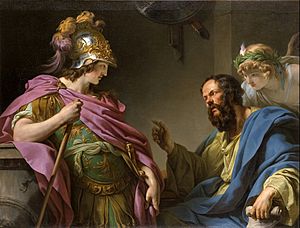
Alcibiades Being Taught by Socrates (1776) by François-André Vincent (Musée Fabre)
|
|
| Born | c. 450 BC Athens, Greece |
| Died | 404 BC (aged 45-46) Mount Elafos, Phrygia, Achaemenid Empire (modern-day Turkey) |
| Allegiance | Athens Sparta (415–412 BC) Persia (412–411 BC) |
| Rank | General (Strategos) |
| Battles/wars |
|
Alcibiades (c. 450 – 404 BC) was a very important leader in Ancient Athens. He was a skilled politician, a great speaker, and a military general. He played a big part in the second half of the Peloponnesian War, which was a long fight between Athens and Sparta.
During this war, Alcibiades changed sides several times. First, he was a leader in Athens. He pushed for Athens to attack Sicily. But then, his enemies accused him of a serious religious crime. He had to run away to Sparta. In Sparta, he became an advisor and helped them fight Athens.
However, Alcibiades also made enemies in Sparta. So, he left and went to Persia, where he advised a Persian leader named Tissaphernes. Later, his friends in Athens helped him return. He became an Athenian general again and led them to many victories. But his enemies managed to get him exiled a second time.
Many historians believe that if Alcibiades had led the Sicilian Expedition from the start, it might not have ended so badly for Athens. When he was with Sparta, he helped them hurt Athens a lot. But when he returned to Athens, he helped them win many battles. He often used clever tricks or talks to win cities, instead of long sieges. Alcibiades was very talented, but he also made many powerful enemies. This meant he never stayed in one place for long.
Contents
Alcibiades' Early Life
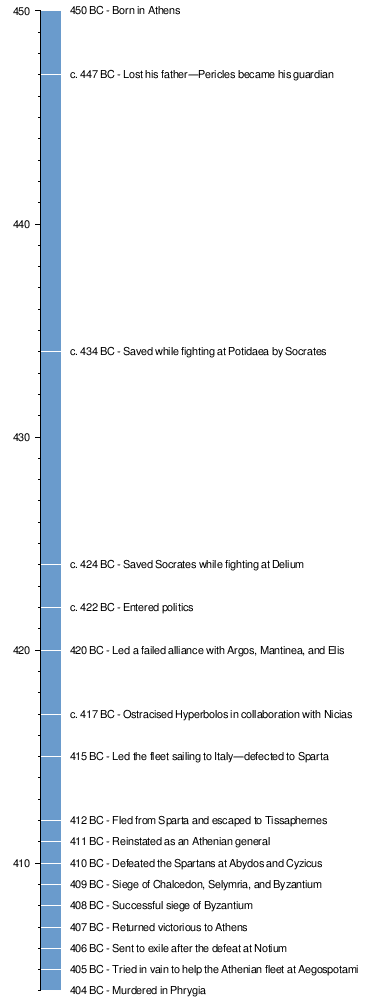
Alcibiades was born in Athens. His family had old connections with the Spartan leaders. His mother, Deinomache, came from the powerful Alcmaeonid family. Famous leader Pericles was her cousin. After Alcibiades' father died in battle, Pericles became his guardian.
Alcibiades had many famous teachers, including the philosopher Socrates. He was very good at public speaking. Socrates believed he could teach Alcibiades to be a better person.
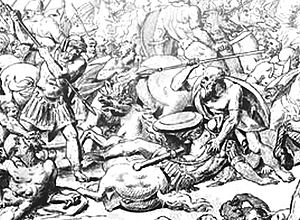
Alcibiades fought in the Battle of Potidaea in 432 BC. It is said that Socrates saved his life there. Alcibiades later saved Socrates at the Battle of Delium in 424 BC. Alcibiades and Socrates had a very close relationship. Alcibiades looked up to Socrates and respected him greatly.
Alcibiades married Hipparete, who was from a very rich Athenian family. Her large dowry made Alcibiades' family even wealthier. They had two children, a son and a daughter. Alcibiades was known for being very handsome.
Alcibiades' Political Journey
Becoming a Leader in Athens
Alcibiades first became well-known after the Peace of Nicias was signed. This treaty was a shaky peace between Sparta and Athens during the Peloponnesian War. Alcibiades felt ignored because he was young. He was upset that Sparta had made the treaty with other Athenian leaders, not him.
Alcibiades was very clever. He secretly met with Spartan ambassadors in Athens. He convinced them to tell the Athenian Assembly that they did not have full power to negotiate. This made the Spartans look bad and made Alcibiades look good. He was then chosen as a general.
He used his growing power to create an alliance. This alliance was between Athens and other cities in the Peloponnese, like Argos. This threatened Sparta's power in the region. However, this alliance was later defeated in the Battle of Mantinea.
Around 416–415 BC, Alcibiades worked with another leader, Nicias. They managed to get a rival, Hyperbolos, exiled from Athens. This showed that Alcibiades had many followers who would vote as he wished.
Alcibiades supported the decision to attack the island of Melos in 416–415 BC. The men of Melos were killed, and the women and children were enslaved.
The Sicilian Expedition
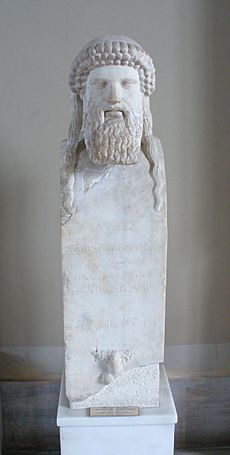
In 415 BC, people from the city of Segesta in Sicily asked Athens for help. They were fighting against another city, Selinus. During the talks, Nicias strongly opposed sending help. He said it would be too expensive. Alcibiades, however, strongly supported the idea. He argued that the campaign would bring Athens great wealth and make its empire bigger.
Alcibiades believed Athens could gain allies in Sicily. He thought they could even conquer Syracuse, the most powerful city there. Nicias actually suggested making the fleet much larger, from 60 ships to 140. He hoped this huge cost would stop the plan. But instead, it made the Athenians even more excited. Nicias, Alcibiades, and Lamachus were all chosen as generals for the expedition.
Just before the fleet left, many statues of the god Hermes (called hermai) were damaged in Athens. This was a serious religious scandal. Alcibiades was accused of being involved. His enemies also said he had disrespected religious ceremonies. Alcibiades wanted to stand trial right away to clear his name. But his request was denied. The fleet sailed with the charges still hanging over him.
As Alcibiades suspected, his enemies used his absence to accuse him further. They even said he was plotting against Athens' democracy. When the fleet reached Sicily, a ship arrived to take Alcibiades back to Athens for trial. Alcibiades escaped at Thurii and fled. In Athens, he was found guilty without being there and sentenced to death. His property was taken away.
Alcibiades then contacted the Spartans. He promised to help them against Athens if they gave him a safe place. The Spartans agreed.
Joining Sparta
Alcibiades became a military advisor to Sparta. He helped them win several important victories. He told them to build a permanent fort at Decelea, very close to Athens. This cut Athens off from its farms and silver mines. This move was very damaging to Athens. It forced citizens to live inside the city walls all year. They had to rely on sea trade for food.
Seeing Athens struggling, other cities in the Delian League (Athens' allies) began to think about revolting. After Athens' terrible defeat in Sicily, Alcibiades sailed to Ionia. He convinced several important cities to revolt against Athens.
However, Alcibiades eventually lost favor with the Spartan government. He was accused of having a relationship with the Spartan king's wife. It is said that a Spartan admiral was ordered to kill him. Alcibiades found out and escaped to the Persian leader Tissaphernes in 412 BC.
Working with Persia
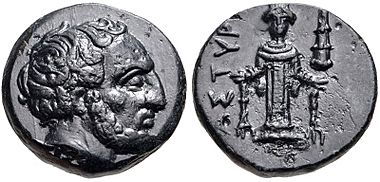
When Alcibiades arrived at the Persian court, he quickly gained Tissaphernes' trust. He gave him several pieces of advice. He told Tissaphernes to give less money to the Spartan fleet. He also advised Tissaphernes not to rush the Persian fleet into the war. Alcibiades said that the longer Athens and Sparta fought, the more tired they would become. This would make it easier for Persia to take over the region later.
Alcibiades' advice helped the Persians, but he had a secret goal. He wanted to use his supposed influence with Persia to get back to Athens.
Alcibiades Returns to Athens
Talking with Athenian Leaders
Alcibiades thought that the Athenian democracy would never let him return. So, he sent messages to Athenian leaders at Samos. He suggested that if they changed the government to an oligarchy (rule by a few), he would return. He also promised to bring Persian money and maybe even the Persian fleet to Athens' side.
Many Athenian military officers liked this plan. They wanted a smaller government where they would have more power. A group of these officers planned to send a messenger to Athens. This messenger would ask for Alcibiades to return and for democracy to be ended.
However, Tissaphernes would not agree to any deal. He wanted to keep Persia neutral and let Athens and Sparta weaken each other. Alcibiades realized this. He tried to make it seem like Tissaphernes was asking for more and more from Athens. He hoped to convince the Athenians that he had almost convinced Tissaphernes, but they hadn't given enough. The Athenian messengers were angry at the high demands. They realized Alcibiades couldn't deliver on his promises. So, they stopped their plans to bring him back.
Becoming a General Again
Despite these failed talks, the conspirators in Athens managed to overthrow the democracy. They set up a government called the "Four Hundred," which was an oligarchy. But at Samos, the Athenian soldiers and sailors did not support this change. They stayed loyal to democracy. They removed their generals and elected new ones, including Thrasybulus and Thrasyllus.
Thrasybulus then convinced the soldiers to vote for Alcibiades' return. He sailed to get Alcibiades and brought him back to Samos. The goal was still to win Persian support away from Sparta.
When Alcibiades spoke to the troops, he complained about his exile. But mostly, he boasted about his influence with Tissaphernes. He wanted to scare the oligarchs in Athens and gain more respect from the army. The troops immediately elected him general. They even wanted to sail to Athens right away and attack the oligarchs. But Alcibiades and Thrasybulus calmed them down. They showed that this would cause a civil war and lead to Athens' defeat. Soon after, the government of the Four Hundred was overthrown.
Alcibiades then sailed to meet Tissaphernes. He told the troops he would bring the Persian fleet to their side or stop it from helping the Spartans. But Alcibiades already knew that Tissaphernes never planned to bring the fleet at all.
Victories at Abydos and Cyzicus
Alcibiades returned to Athens in 407 BC, but he waited until he had achieved more victories. He wanted a glorious return. He raised money from nearby areas to pay his soldiers and sailors.
He played a key role in the Battle of Abydos. The battle was very close. But when Alcibiades arrived with 18 more ships, the tide turned for Athens. The Persian leader Pharnabazus, who now supported Sparta, brought his army to the shore. This saved the Spartan ships from being completely destroyed.
After the battle, Alcibiades tried to meet Tissaphernes again. But he was arrested. He escaped within a month and took command again. It was clear now that he had no real influence with the Persians. His power would depend only on his actions.
The next big sea battle was at Cyzicus in 410 BC. Alcibiades and the Athenian commanders planned a trick. Alcibiades sailed with a small group of ships to lure the Spartan fleet out. When the Spartans chased him, other Athenian squadrons came from behind. They trapped the Spartans.
The Spartans tried to escape to the shore. Alcibiades' troops landed and tried to pull the Spartan ships into the sea. The Spartans and Persians fought back. But more Athenian forces arrived. The Spartans and Persians were defeated. The Athenians captured all the Spartan ships that were not destroyed. A message sent to Sparta was captured. It said: "The ships are lost. Mindarus is dead. The men are starving. We know not what to do." Soon after, Sparta asked for peace, but Athens refused.
More Military Successes
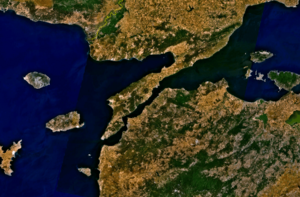
After their victory, Alcibiades and Thrasybulus began to besiege Chalcedon in 409 BC. Alcibiades won a small land battle outside the city. They made a deal with the Chalcedonians and a temporary alliance with Pharnabazus. This gave the army some much-needed money.
Alcibiades then went to the Thracian Chersonese and attacked Selymbria. He worked with people inside the city who supported Athens. He offered the Selymbrians fair terms. He made sure his soldiers did not harm the city. He only took money and left a small army there. Historians say this was a very clever move. It saved time, resources, and lives.
From there, Alcibiades helped besiege Byzantium. Some citizens in Byzantium were tired and hungry. They decided to surrender the city to Alcibiades under similar terms. On the chosen night, the defenders left their posts. The Athenians attacked the Spartan soldiers in the city. Alcibiades promised safety to the citizens who remained loyal to Sparta. This made them turn against the Spartan soldiers, who were almost completely destroyed.
Alcibiades' Final Years
Return to Athens
After these successes, Alcibiades decided to return to Athens in the spring of 407 BC. He was very careful because of the changes in government and the old accusations against him. He first went to Samos, then collected money. He checked on the mood in Athens. When he was sure the city welcomed him, he sailed into Piraeus, Athens' port.
A huge crowd had gathered to see him. He was scared at first, but then he saw his friends and family. When he landed, he was greeted like a hero. However, some people saw a bad sign. He had returned on the day of the Plynteria, a religious ceremony. This was considered the unluckiest day of the year for important events. His enemies remembered this.
All the criminal charges against him were dropped. Alcibiades showed his religious devotion by leading a special procession to Eleusis by land. This procession had been done by sea since Sparta occupied Decelea. Alcibiades used soldiers to protect the traditional land route. His property was given back to him. The Athenian Assembly elected him supreme commander of land and sea.
Defeat at Notium
In 406 BC, Alcibiades left Athens with 1,500 soldiers and 100 ships. He failed to capture Andros and then went to Samos. Later, he moved to Notium, closer to the Spartan fleet. Meanwhile, a new Persian leader, Cyrus the Younger, started giving money to the Spartans. This made the Spartan navy grow quickly. The Spartans also had a very skilled admiral named Lysander.
Alcibiades needed money and wanted another big battle. He left Notium to help another general. He left about 80 ships under the command of his helmsman, Antiochus. Alcibiades gave Antiochus strict orders not to attack. But Antiochus disobeyed. He tried to trick Lysander into a fight.
However, the situation at Notium was different from Cyzicus. The Athenians had no surprise. Lysander knew about their fleet from deserters. Antiochus's ship was sunk, and he was killed. The rest of his ships were chased back to Notium. The main Athenian force was caught unprepared by the entire Spartan fleet. Lysander won a complete victory. Alcibiades returned and tried to win another battle to make up for the defeat, but Lysander would not fight again.
Alcibiades was blamed for the defeat. His enemies used this chance to remove him from command. Some historians today think he was unfairly blamed for Antiochus's mistake. Alcibiades went into exile again. He never returned to Athens. He sailed north to his castles in the Thracian Chersonese. This defeat was very bad for Athens. Alcibiades and other skilled commanders were removed. This helped lead to Athens' surrender two years later.
Death of Alcibiades
Alcibiades' role in the war mostly ended with his removal from command. Before the Battle of Aegospotami, he saw that the Athenian fleet was in a bad spot. He advised them to move to a better harbor. But the Athenian generals refused his advice. They thought that if they won, everyone would give credit to Alcibiades. Days later, the Athenian fleet was completely destroyed by Lysander.
After this defeat, Alcibiades went to Hellespontine Phrygia. He hoped to get help from the Persian King Artaxerxes II of Persia against Sparta. Many Greek nobles who had problems at home found safety in the Persian Empire. They were often welcomed and given land.
How Alcibiades died is not fully clear, as there are different stories. The oldest accounts say the Spartans, especially Lysander, were responsible. According to one story, Lysander sent a message to Pharnabazus. Pharnabazus then sent his brother to where Alcibiades was living.
In 404 BC, as Alcibiades was about to travel to the Persian court, his home was surrounded and set on fire. He was killed.
What People Thought of Alcibiades
His Political and Military Skills
In ancient Greece, people had very different opinions about Alcibiades. Some said he was too ambitious and only cared about wealth and fame. Others said he was a great general and diplomat. They believed he was very skilled. Some historians say that if he had led the army in Sicily, Athens would have won.
However, others believed the Sicilian expedition itself was a big mistake. They said Alcibiades' plans were too grand and risky. Some also criticized him for leaving his fleet in the hands of an inexperienced officer at Notium.
Alcibiades was known for his amazing speaking skills. People said he was very persuasive and charming. He could make people believe him. He was able to adapt his speeches to what his audience wanted to hear.
Even today, historians disagree about Alcibiades. Some see him as a brilliant but flawed leader. Others see him as a selfish and untrustworthy person. But most agree he was a very important figure in ancient Greek history.
See also
 In Spanish: Alcibíades para niños
In Spanish: Alcibíades para niños
 | Claudette Colvin |
 | Myrlie Evers-Williams |
 | Alberta Odell Jones |



